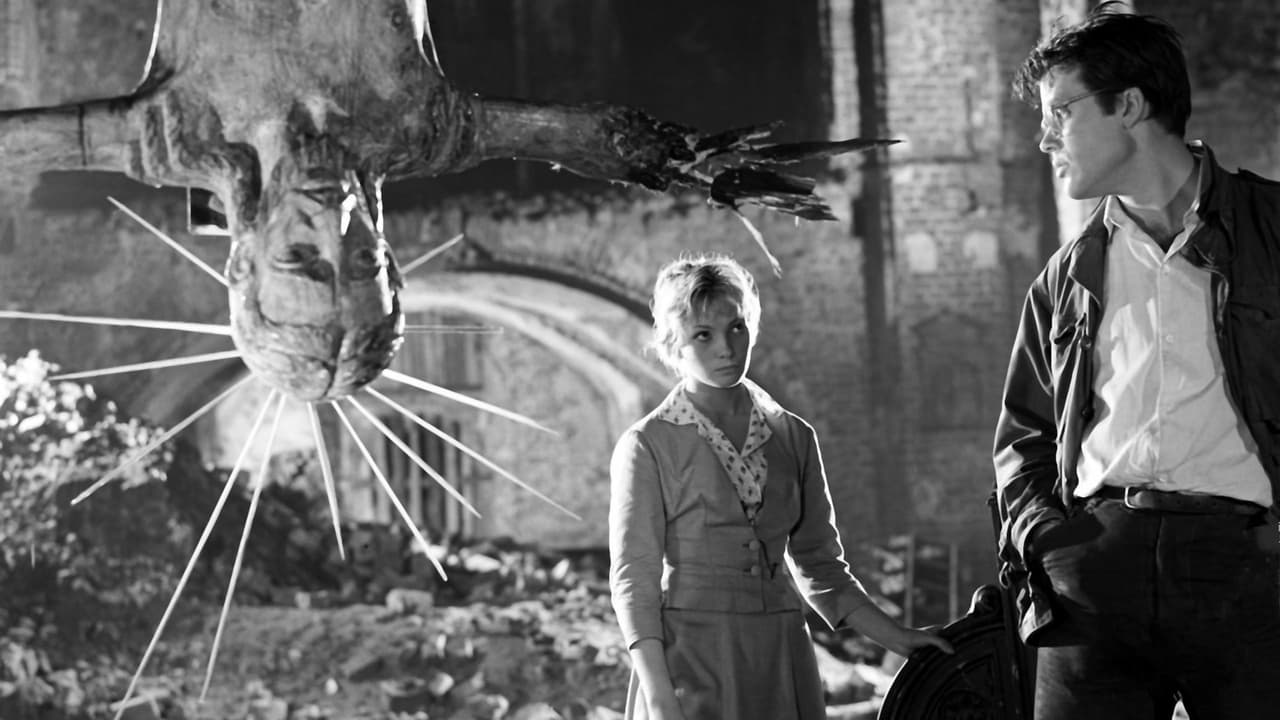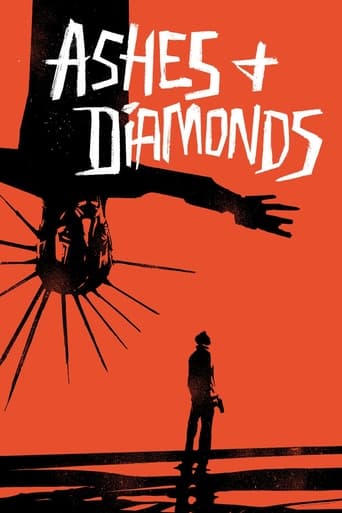



I wanted to like it more than I actually did... But much of the humor totally escaped me and I walked out only mildly impressed.
View MoreStory: It's very simple but honestly that is fine.
This is a dark and sometimes deeply uncomfortable drama
View MoreThe story, direction, characters, and writing/dialogue is akin to taking a tranquilizer shot to the neck, but everything else was so well done.
View MoreASHES AND DIAMONDS is a war drama, which describes, in a realistic way, the situation in a small town in Poland on the last day of World War II. The film was based on the 1948 novel by Polish writer Jerzy Andrzejewski.Inhabitants of a provincial town are trying to adjust to peacetime life. However, the conflict between the new communist government and members of the war resistance is inevitable. A young war veteran, who has joined the resistance, has received an order to assassinate a communist official. His enthusiasm for the task starts to weaken, when he meets a young girl and falls in love ....Mr. Wajda has artfully presented symbols of the ruined country and lost youth in the war. These symbols are visible in almost every scene. Glasses of brandy on fire, love in ruins, a vulgar feast, Polonaise in false, a bloody sheet and a young man who dies in spasmodic twitches at the dump are just some of them. The faces of the protagonists are colored with uncertainty. The story, which is tense, cynical, melancholic and shocking, is accompanied by vivid images of lost people and dilapidated buildings. Characterization is very good and it is reflected through greed, self-satisfaction, consistency, serenity and compassion.Zbigniew Cybulski as Maciek is a certain version of James Dean. He is an appealing and sensible young man, who is on the verge of despair. He insights tranquility and love, and yet, his life is only one segment in a nasty political rut. Ewa Krzyżewska as Krystyna is a hotel barmaid. She is perhaps too polite and somewhat insecure in love. War and political psychology rarely accept ordinary life questions.
View MoreThis film is set on the last day and night of WWII in Europe. Poland is liberated from the tyranny of Nazi Germany and falls into the hands of Joseph Stalin. At the time the Poles were not sure what this meant but they feared the worst. The end of the war, of course, meant something quite different for Poland than it did for France or England. The "liberation" of Poland was just another invasion and occupation and the Resistance shifted targets from Nazis to Polish communists and in doing so went from heroes of Poland to criminals.The story follows Maciek, a young Resistance fighter. His assignment is to assassinate a Polish Communist leader who is in town for a banquet to celebrate the end of the war and his subsequent promotion. It's a long night with lots of drinking, reminiscence, hopes and fears for the future and the unexpected crises of confidence that conflicts our protagonist, Maciek. He falls for the beautiful young barmaid at the hotel and for the first time sees a different life for himself and questions what he is about to do. A heavy feeling of impending doom hangs over the film as the fates of people and a country are in doubt. Into this the director weaves some comical characters and a tragic romance. Good stuff.The look of the film is very expressionist as opposed to the neorealism which was a common style of directors in Europe at the time. The ideal was American Film Noir which the director was a big fan of – The Asphalt Jungle being his favorite. The entire hotel was built and lit artificially so they could create the look and feel they wanted. And, there were a lot of very artistic, purely visual effects and what some might call overly expressionist scenes: a drunken polonaise at sunrise, an upside down crucifix in a bombed out church, a white horse wandering into the frame in a scene in the hotel courtyard. Beautifully photographed in shadowy black and white, this film succeeds as a work of art on every level.The film is based on a book that depicted the assassination target, Szczuka, as the sympathetic figure. And, really, he's not a bad guy. However the director went the other way and made a minor character in the book (Maciek) the lead player. The role was played by one of the leading young actors in Poland, Zbigniew Cybulski. The director let Cybulski keep his trademark long hair and dark glasses even though he knew no WWII resistance fighter looked like that. Even though the Party watchdogs made sure Maciek's ultimate fate was punctuated (in another overly expressionist scene), the Polish movie going public perceived the film as it was intended and Maciek was seen as the hero. Too late to censor the movie in Poland, they were determined to not let it get out of Poland. They were successful in stopping it from going to Cannes but a Party Minister relented and let it go to the Venice Film Festival, allowing it to be seen "out of competition." It won the Grand Prize anyway, Cybulski became the James Dean of Poland and the Party Minister was fired (at the very least). The film is considered one of the greatest films in Polish cinema. 10/10.
View MoreI first discovered the enormity of the atrocities perpetrated by the Soviets in Poland through the non-fiction book The Captive Mind, by Polish author Czeslaw Milosz. One of the things that stuck with me was that the Polish resistance members who fought the Nazis were not seen as heroes by the Soviets, because those Poles were defending the old bourgeois order. So the old militaries and intelligentsia had to be killed to pave the way for a new state that upheld the values of the revolution.Andrzej Wajda captures this situation in Ashes and Diamonds, adapting a novel by Jerzy Andrzejewski, coincidentally one of the intellectuals Milosz devotes a chapter to and who served the revolution with a lot of faith and ardour. Still, this is not a propaganda movie; Wadja somehow managed to trick the censors into not seeing criticism against the way the Soviet Union betrayed the people who believe in its ideals.Actor Zbigniew Cybulski plays Maciek Chelmicki, a killer working for the communists, who receives orders to kill Szczuka, a Communist leader. Although Maciek always found killing easy in the past, now he has to kill a former soldier and one of the many who believes in the Soviet Union. Furthermore, after falling in love with a barmaid, he realises that his life is a cycle of violence and that he wants to put an end to it. What follows is a night of self-discovery for the young killer.Although I wanted to like this movie more, a disjointed and often confusing narrative construction threw me off at several points. Cybulski is perfect as the killer, though, initially relaxed and thorough, then as the night progresses he becomes introspective and melancholic. I also loved the cinematography, especially the games between light and shadow. My favourite sequence was the murder of Szczuka. As he falls in Maciek's arms fireworks ignite in the sky celebrating the end of war; Maciek runs away leaving the body by a puddle, the fireworks reflecting in the water. His personal crisis and the celebration of an entire country come together and we know the future won't bode well for either.In free countries like Italy and France cinema revered communism. Movies like Novecento sound awfully dated nowadays. In countries where communism existed under no guises, their movies have remained timeless. This is not just a condemnation of one of the most oppressive totalitarian regimes that ever existed, but a depiction of human nature wherever ideals overthrow respect for life and dignity. Fifty-one years later, Ashes and Diamonds remains modern.
View MoreI have seen this film several times and often I asked myself how the director Andrzej Wajda was allowed to film something that clearly shows the corruption of the new governing bodies in post-war Poland. This is a film of 1958, i.e. Poland well occupied by the Soviet troops and only 2 years after the Hungarian massacre. The acting of already disappeared Zbigniew Cybulski as Maciek is really impressive and reminds me to some extent James Dean playing "Rebel without a Cause". The personality of Maciek is difficult to understand if one ignores the suffering of Polish people during the war. Once this bloody confrontation finishes the Soviet came over and put their loyal people in the important posts of the government. The fact is that those soviet loyalists were not the appropriate ones, often corrupted and looking to climb for better position. The presence of the Soviet officers in the official parties and ceremonies was very common and this can also be well seen. Ewa Krzyzewska plays the role of a young lady working in a restaurant,she wants to live and to love, but even her dreams cannot become a reality. The film draws what was then wrong in Poland and how wrong the people felt and behave. Maciek is used by an anticommunist violent movement, in fact he wants to live differently, to stop fighting, to live and to love too. This film is really one of the classic of the filmography of Eastern Europe under the domination of the Soviets.
View More